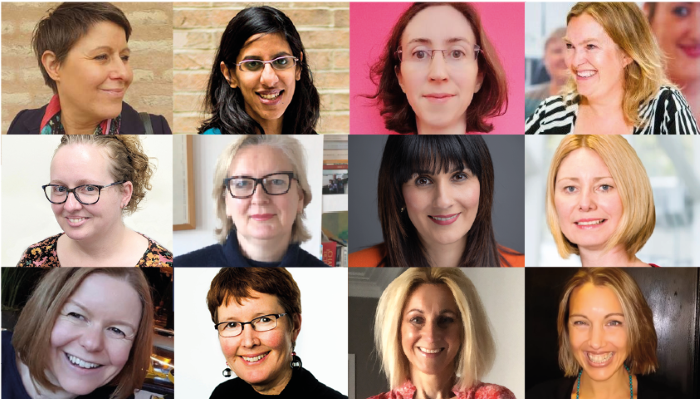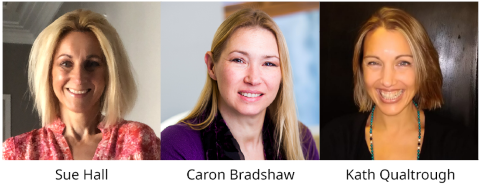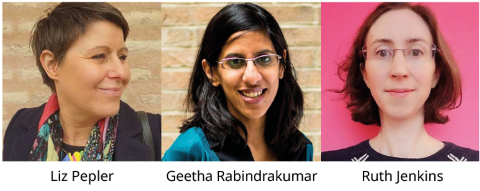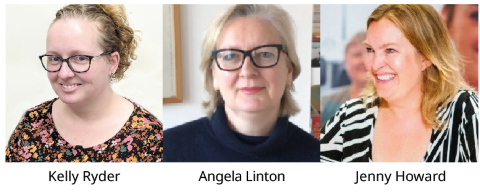The month of March is when people across the world celebrate the achievements of women and the contributions they make. We speak to a few women about leading the way in charity finance...

We asked women from across the charity finance sector why they love what they do, what they’re most proud of and who has inspired them in their lives and careers. Their brilliance and the enthusiasm they have for honouring and recognising others shines through.
Read on to discover more about some of the women who are passionate about charity finance, and learn from their collective experiences and wisdom...
Now and then
We began by asking women in charity finance what it was like for them when they began their careers, the challenges they’ve faced, and how things have changed.
Their responses paint a picture of a sector and profession that has rapidly evolved, one that is embracing greater diversity and women as leaders. Is there still a way to go?
Sue Hall, Caron Bradshaw and Kath Qualtrough – three leaders at Charity Finance Group – share their thoughts…
“When I started my career in finance, in local government in the early 1990s, my office was pretty evenly split between women and men in total, but the difference at the manager and above level was stark. It was pretty much 100% men,” recalls Sue, Chief Operating Officer at Versus Arthritis and interim director at CFG.
“When I initially put forward my application to my manager to pursue my formal CIMA accountancy qualification, his reply was: ‘Why would you want to do that? You’ll be married and having children in a few years!’ Needless to say, I ignored him, and went ahead with vigour and became a director by the time I was 40 years old – something he never managed in his whole career!”

Did Caron have a similar experience?
“Yes! But thankfully, it’s a long time since a colleague suggested that women in finance would simply be seeking childcare vouchers and discounts on shoes and handbags!”
Caron says she was also once accused by a male colleague of being “too girly”. That may have been a couple of decades ago, but have expectations of women in leadership changed much since?
“I have been in many a meeting where it’s been assumed I am an assistant rather than a CEO. There is still a lack of true diversity, particularly at senior positions," adds Caron.
In 2024, there were some big steps forward for women in finance, with the appointments of the first female Chancellor of the Exchequer, Rachel Reeves, and first female CFO of HSBC Group, Pam Kaur. Despite this, financial services lags behind when it comes to promoting women to the top roles. Underrepresentation at C-suite level remains a problem in the charity sector, too.
The charity sector isn't doing much better. A report by Pro Bono Economics shows that women make up 68% of the charity sector’s employees, but between 56% and 63% of the sector’s CEOs. In the largest charities that falls to 35%.
Women are also less likely to hold management positions. In 2022, 30.5% of women employed in the charity sector were managers compared to 37.8% of men.
The gender pay gap persists too. A report published by ACEVO last year showed that the pay gap at leadership level had risen and that lack of diversity within the sector is still prominent.
“The profession is still largely dominated at senior level by white, heterosexual, middle class men," states Caron. "Women make up more than 50% of the intake of trainee accountants and have done so for decades. Thus, it doesn’t make sense that such a tiny number to make it to the top. That isn’t about merit, it’s about the environment.”
So, what can organisations do to promote and nurture women into leadership positions? What’s hindering progress?
“Ask them!” says Caron. “Ask women what needs to change. This won't just be good for women it will be good for everyone. Stop thinking about helping women navigate a challenging environment that doesn’t meet their needs, and start thinking about changing the environment so it better meets everyone’s needs. We don’t have to do things the way we’ve always done them. We can disrupt the way things are done and design them better!”
Kath Qualtrough started out in the public services department at PricewaterhouseCoopers (PwC) where she could see a clear career path where gender didn’t matter.
“There was quite an equal gender representation in my department, with both male and female partners leading the charity teams that I worked in,” she says. “This meant I could see a good trajectory for growth as a charity finance professional, whatever one’s gender.
“It was clear that performance was what mattered to move up and this is something that has carried me through to now being a senior leader in the field, as the director of finance operations at the CFG.”
Visible role models in the workplace are clearly important. As Billie Jean King once said, ‘you have to see it to be it’. Fortunately, charity finance isn’t short of incredible people. The women we spoke to enthusiastically shared their greatest influences, role models, champions and friends, many of whom are listed at the end of this article.
Paying tribute to one’s own achievements is important, as is recognising those who support you along the way. Sue continues: “I have worked for and with many inspiring women leaders in my career to date and looking back now have had more women finance directors and CEOs than male, so I really do believe that the field – in the public and not-for-profit sector especially – is truly open to all.
“We have worked hard to allow flexibility in how you work to accommodate families and caring commitments, and I have never felt that I have been turned down for a role due to my sex or gender.”
Making the world a better place
Research has shown that women are less likely to be credited for their achievements than men. There’s also evidence that where performance and tasks are unclear – for example where there is no tangible and defined work product or where the merit is difficult to assess – women are evaluated as less competent than men.
It’s a similar story when women work in mixed groups. If no information about the women’s individual contributions is given, such contributions can often be overlooked or discounted. It’s important to shout about women’s achievements where we can so we invited women in the charity finance to share their proudest moments.
Liz Pepler has worked in finance and operations for numerous charitable organisations. As founder of Embrace Finance, she now consults on charity resilience. Her proudest moment in recent years was when Embrace Finance was invited to do an action research project with Lloyds Bank Foundation.
Liz explains: “Along with charity partners, we explored what it means to be a resilient small charity in an uncertain world. Organisational resilience is simple to say, but is so, so difficult to do. I use a resilience informed approach daily in my work with small charities and the more I do, the more essential I know it to be.”

Geetha Rabindrakumar is Chief Operating Officer at the British Asian Trust, having started out in audit and accountancy roles at PwC and Cancer Research UK. Like Liz, she’s passionate about bringing people, knowledge and ideas together and is proud of her broad experience.
“I was director of finance at disability charity Scope, where I led on the development of a social investment bond issue, then had an incredible role at Better Society Capital whilst social impact investment was developing in the UK.
“I’ve been at two smaller arts charities in roles outside of finance, covering impact, strategy, external partnerships and programmes, and even IT. It’s brilliant for me now to draw on that all round experience in my current role and I’m enjoying coming back to finance responsibilities with a broader strategic perspective that I hope is valuable for the organisation.”
Doing everything she can to ensure a future for all, Ruth Jenkins, Finance Director at Keep Britain Tidy, has taken significant steps to reduce the charity's environmental impact and recently shared with CFG how she is doing that through the finance function.
Ruth explains: “We had an eco-audit done for the charity 18 months ago. When our auditor reported back, it became apparent that over 99% of our carbon footprint was from financed emissions – from our banking and pensions. Listening to him I remember feeling goosebumps. The work I was responsible for was driving global heating.
“I’m really proud that since then we have switched banks and have cut our banking footprint by two thirds. We enrol all new staff in a low carbon net-zero pension scheme as a default and we have negotiated with our defined benefit pension trustees to switch to lower carbon investments. These are all really easy steps for finance teams to take, and they will make a big difference to all of our futures.”
A sector and career like no other
The charity sector is facing significant recruitment and retention challenges with recent research by TPP Recruitment finding that 82% of charities reported difficulties in filling vacancies in 2024, with finance roles being particularly hard to fill. To help address these challenges, it’s important to communicate the benefits and satisfaction that can come from a career in charity finance.
Geetha says her desire to work in the not-for-profit sector began at an early age through volunteering. After graduating with a science degree, she knew she wanted to pursue a career in the sector but no charity would employ her. Her breakthrough came when an advisor at a graduate careers fair pointed her to a PwC training scheme in the public and not-for-profit sector team.
“At the time I had no idea what an auditor did! But the rest of my career came from that. My interest in the sector and its impact has always come first. I’ve been utterly absorbed by the mission of every organisation I’ve been involved with as a staff member or volunteer.”

For Kelly Ryder, Finance Manager at The Orchard Trust, having returned to work after having her second child, she found that her role, working for a global manufacturing company, no longer offered her the same job satisfaction.
“I started looking for a new role, which brought me to the charity where I work now. I have found working in the charity sector so much more rewarding than working in the corporate world. The charity I work for provides residential care and day opportunities for adults with profound and multiple learning disabilities. I feel working for a charity gives my role a purpose and I can see my input making a difference to the lives of the people we support.”
These thoughts are echoed by Angela Linton, Chief Operating Officer at Youth Music, who explains: “I am always mindful of the fact that I am in a position where I get to be party to decisions which have an impact on people’s lives whether that be as a result of providing grants to over 500 projects across the country and up to 300 emerging young creatives or as a direct result of our commitment to ensuring that staff and those working on projects are paid a real living wage."
It was a similar story for Jenny Howard who is now Director of Finance and Digital at Marine Society and Sea Cadets. Her career started as a civil servant, but the role didn’t inspire her. Through her network, she became a financial controller at one of Scotland’s leading social care charities, Carr-Gomm. With their support, she was appointed as their finance director before the age of 30 and, since then, hasn’t looked back.
Jenny explains: “I love working in the charity sector because everything you do moves the charity forward and helps achieve its objectives. I am a firm believer that you cannot provide support roles to a charity without understanding what the charity does.”
Like Jenny, Sharon Martin’s career began in the public sector but switched to work for charities. Today, she is Chief Financial Officer at Born Free Foundation and says the charity’s work and her varied role helps her to continually learn and grow.
Says Sharon: “I have always been driven by the ethos of working towards something that is for the benefit of others, rather than for financial gain. Moving into the charity sector allowed me to hone that contribution, to help benefit the causes I really care about.
“I love the amount of collaboration and knowledge-sharing that there is within the charity finance profession. Peers in other charities are always willing to share and support, and there are some fantastic umbrella bodies. You never feel like you are on your own.”
Developing the next generation
Sharon says that promoting charity finance as a career option and a profession in its own right would benefit the charity sector. What advice does she have for those looking to build a career in charity finance? What skills will be needed?
“Strong interpersonal skills are essential and the ability to communicate clearly, avoiding financial jargon,” believes Sharon.
“This helps build effective working relationships, as does having a sense of humour. There is no manual that comes with the role, so you need to be self-motivated to keep up-to-date with legal and regulatory developments.”
Nazreen Visram is Head of Public Sector, UK Corporate Banking at Barclays and Deputy Co-Chair of Inspire. She agrees that staying current is vital: “The world is changing faster than ever so continuous learning is essential to staying relevant. I would advise building relationships, not just networks. Fostering meaningful and genuine connections is important.”
Nazreen also advises being authentic: “When I first started in banking, I felt I needed to fit in. But over time I realised my difference was my edge – I brought something different to the table.”

Nicki Deeson has worked in senior finance roles for Amnesty International and Alzheimer's Society. She now runs her own business coaching and mentoring consultancy and leads CFG’s Peer Mentoring Scheme. Her advice is to consider becoming a trustee or treasurer.
“This will teach you valuable leadership, strategic and governance skills, increase the diversity of charity boards and inspire others,” explains Nicki. “Mentorship initiatives, like CFG’s scheme or other organisational mentorship programmes, can significantly support women in financial leadership roles.”
As one of the scheme's alumni, Kelly Ryder says: “If you are fortunate enough to find yourself at a charity who are CFG members, ask about the CFG Peer Mentoring Scheme. It's a valuable resource and a great source of support if you are just starting out. Don't let anything hold you back, there is lots of support out there to help you along your way."
Career development is so much more than mastering technical skills, it’s about keeping an open mind, embracing change and truly understanding what drives you. For Jenny Howard it's also about purpose. “Find a cause you are passionate about," she advises. "It frustrates me when I interview people and they cannot articulate why they want to work with us. Boring answers such as ‘I’ve always worked in the charity sector and this role came up’ and ‘I want to give something back’ do not cut it.”
Sue Hall agrees: “The charity sector is complex, interesting, rewarding and hugely satisfying. I feel it’s a great place to start a career, especially in a smaller charity, as you will get to see a wide range of specialties and responsibilities close up which will benefit your skills and experience very quickly.
"I always feel proud to talk to my friends and family about the charities that I have and currently work for and know that I am making a difference to the people they support and those that fund us. Go for it!”
The final words go to Jill Halford, Head of Not for Profit at BDO who says: “Coming into accountancy many moons ago, there were few female leaders to look to, but I found so many in the charity sector who inspired me. The sector is full of fabulous female finance leaders, and I feel honored to have worked with so many. That is why I have stayed with the sector and that’s why I love it.”
With thanks to the following women for contributing:
- Caron Bradshaw OBE
- Nicki Deeson
- Jill Halford
- Sue Hall
- Jenny Howard
- Ruth Jenkins
- Angela Linton
- Sharon Martin
- Liz Pepler
- Geetha Rabindrakumar
- Kelly Ryder
- Kath Qualtrough
- Nazreen Visram
Here are just some of the women who inspire them:
Catherine Webster, Plan International – “An influential mentor who hugely inspired my career choices by showing me that accountants excel in many roles.”
Fiona Fagan, Carr-Gomm – “She taught me to believe in myself, trusted me to act up when she went on maternity leave and encouraged me to go for the FD role when she left.”
Catherine Sullivan – “An amazing charity transformation professional.”
Cara Turtington, Saffery – “A gifted with encyclopaedic knowledge and calm.”
Ruth Chapple, Veganuary – “Skilled at complex change management.”
Liz Kelliher, ProVeg UK – “She came with no finance background and has developed her skills so extensively – a fabulous example of women in charity finance just taking on whatever needs to be done and really improving an organisation’s financial infrastructure.”
Janet Eilbeck, UK National Audit Office
Sarah Isted, PwC
Sarah Talbot-Williams, Senior Independent Director, NED/Together for Short Lives
Vicky Browning, Interim Charity CEO – “A superb CEO, leader and much fun."
Dame Julie Maxton, “The first female CEO of the Royal Society in 350 years! This followed many other female firsts – first female Dean leading the law faculty at University of Auckland and first female Registrar at the University of Oxford in 550 years! I learnt so much from her and she is a lifelong friend.”
Charlotte Young, School for Social Entrepreneurs – “She keeps us honest and mission focused and is the most challenging and supportive trustee.”
The late Luli Nuzi, Founder of Shpresa Programme – “A visionary leader who believed in integration with dignity, not assimilation. Luli was more than an inspirational female leader; she was a friend, a mentor, and an unstoppable force for change.”
We're always looking for positive stories and case studies. If you have an achievement or piece of work you're proud of, share it with us. Email the team and we'll take it from there!